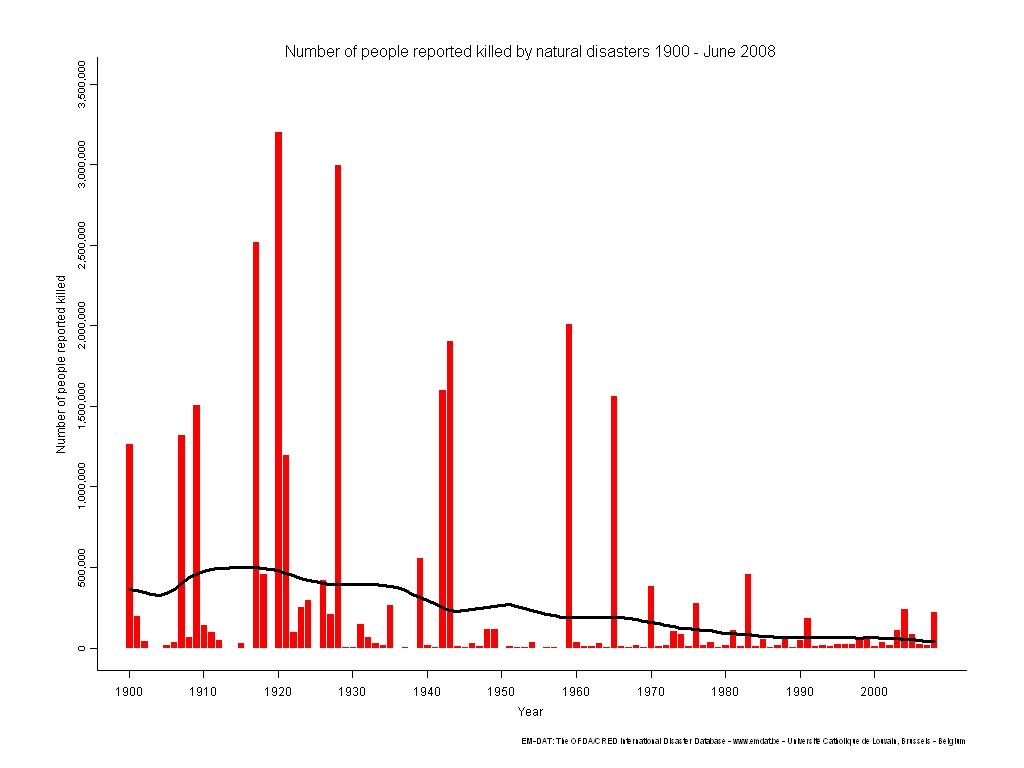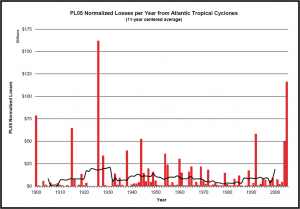Overselling Disasters and Climate Change by Munich Re
December 30th, 2008Posted by: Roger Pielke, Jr.
Munich Re, one of the largest global reinsurance companies, has often skirted near the line of scientific credibility when discussing disaster losses and climate change. This week Munich Re stepped way over that line when it uses the issue of human-caused climate change to suggest higher reinsurance rates and support for a global climate treaty.
In a press release Munich Re observes of 2008:
Catastrophe figures for 2008 confirm that climate agreement is urgently needed
What else might be needed? How about higher reinsurance rates, which Munich Re hints at not so subtly:
Torsten Jeworrek, member of Munich Re’s Board of Management: “2008 has again shown how important it is for us to analyse risks like climate change in all their facets and to manage the business accordingly,”
What evidence is there that indicates that confirm the need for a climate agreement?
First, Munich Re points to the large loss of life from disasters in 2008:
Throughout the world, more than 220,000 people died as a result of natural catastrophes this year.
Tragic, to be sure, but caused by climate change? A third of these deaths resulted from the Sichuan Earthquake. A large number of deaths, perhaps 135,000, resulted from Typhoon Nargis in Myanmar. What does 2008 look like in long-term context?
Here is data the Centre for Research on the Epidemiology of Disasters (CRED) at the Université Catholique de Louvain presents data for disaster deaths from 1900- June, 2008.
Over the long term the loss of lives from disasters has gone down remarkably. How about since 1975?
Even as populations continue to grow, there has been no upward trend in the loss of life, despite the tragic reality of major disasters around the world every year. Extracting a climate change signal in that data is just not possible. For a more comprehensive look at trends in losses, see this recent report by Indur Goklany (here in PDF).
What about economic losses?
Economic losses from disasters have been increasing dramatically in recent decades. Could this be due to climate change? Munich Re thinks so — in its press release Munich Re states:
Torsten Jeworrek, member of Munich Re’s Board of Management: “This continues the long-term trend we have been observing. Climate change has already started and is very probably contributing to increasingly frequent weather extremes and ensuing natural catastrophes. These, in turn, generate greater and greater losses because the concentration of values in exposed areas, like regions on the coast, is also increasing further throughout the world.”
These remarks directly contradict the conclusions of a 2006 workshop that Munich Re co-sponsored, and I co-organized with Peter Hoeppe, of Munich Re. From that workshop we published a paper in Science that concluded the following (PDF):
According to data collected by Munich Re, global weather-related economic losses (inflation adjusted, 2006 dollars) have increased from an annual average of U.S.$8.9 billion from 1977–1986 to U.S.$45.1 billion from 1997–2006. However, because of issues related to data quality, the low frequency of extreme event impacts, limited length of the time series, and various societal factors present in the disaster loss record, it is still not possible to determine the portion of the increase in damages that might be attributed to climate change brought about by greenhouse gas emissions (S1). This conclusion is likely to remain unchanged in the near future.
So Munich Re scientists (Hoeppe and E. Faust) publish in Science that attribution of losses to greenhouse gas emissions is not presently possible, and a Munich Re board member says that such attribution is “very probably” leading to more extreme events. Could this be confusion between the research and operations sides of the business? Unlikely. Peter Hoeppe adds to the mixed message when he explains in the press release:
It is now very probable that the progressive warming of the atmosphere is due to the greenhouse gases emitted by human activity. The logic is clear: when temperatures increase, there is more evaporation and the atmosphere has a greater capacity to absorb water vapour, with the result that its energy content is higher. The weather machine runs in top gear, bringing more intense severe weather events with corresponding effects in terms of losses. This relationship is already visible today in the increasing heavy precipitation events in many regions of the earth, the heat waves, and the hurricanes in the North Atlantic. The loss statistics for 2008 fit the pattern that the calculations of climate models lead us to expect.
Hoeppe is now on record in a leading scientific publication saying that the loss data does not allow for conclusive attribution but contradicts himself in a business setting by says that the “weather machine” is increasing losses. In the context of hurricanes, the science clearly does not allow such attribution. He also suggests that climate models result in “calculations” that help to explain “loss patterns.” I’d be very interested in any explnation of what this might mean. I don’t think it means anything at all, but it sure sounds impressive.
Once again, below is a time series of normalized losses for U.S. hurricanes for 1900-2005 (see Pielke et al. 2008, in PDF). Both 2006 and 2007 had almost zero losses, and 2008 had about $30-40 billion (depending on source). See a trend?
The fact is that 2008 disaster losses tell us nothing about human-caused climate change. They offer no pressing reason for passing a climate treaty, since such a treaty can have no real effect on the climate for decades anyway. And even if it did the main reason for increasing losses is social not climatic. There are far better reasons for a global climate treaty than reducing disaster losses, since there are far better approaches to that end (as we argue in our Science paper). Further, there may be good reason for Munich Re to want to increase its rates, but making grossly unsound appeals to the spectre of greenhouse gas impacts on disasters in the near term will both harm its own credibility as a business, and potenially harm efforts to secure a global climate treaty, as overselling the science will inevitably result in a backlash.



December 30th, 2008 at 12:19 pm
“And even if it did the main reason for increasing losses is social not climatic. There are far better reasons for a global climate treaty than reducing disaster losses, since there are far better approaches to that end (as we argue in our Sciecne paper).”
I’m still very high on a developing a portable hurricane storm surge protection system that can be deployed in a few days anywhere in the world (e.g. U.S. Gulf and East Coasts, Venice, Myanmar, Bangladesh, etc.)
Do you know Rick Leuttich at UNC-Chapel Hill, or Ray Plaut, who recently retired from Va Tech?
December 31st, 2008 at 9:32 am
[...] Overselling Disasters and Climate Change by Munich Re [...]
January 2nd, 2009 at 7:47 am
[...] Aktivitäten, mehr betriebswirtschaftliches Engagement als wissenchaftliche Redlichkeit steckt, erläutert Roger Pielke Jr. auf seinem Weblog Prometheus. Wenn Unternehmen nach dem Staat rufen, ist wirklich [...]
January 2nd, 2009 at 11:06 am
Hi,
it seems that Munich Re is pursuing the strategy of emphasizing increasing hazards since the early 1990s. In particular the former head of the geohazards group, Dr. Gerhard Berz was very active (and good) at that. He is really concerned about the perspectives of climate change; originaly he sold the scaring stuff about extratropical storms, e.g.
Berz, G., 1993: Global Warming and the insurance industry. Interdisciplinary Science Review 18 (2), 120-125
Berz, G. and K. Conrad, 1994: Stormy weather: The mounting windstorm risk and consequences for the insurance industry. Ecodecision 12, 65-68
Obviously after the WASA study (WASA, 1998: Changing waves and storms in the Northeast Atlantic? – Bull. Amer. Met. Soc. 79, 741-760), this made little sense to continue; but, in Novemb4re 2008, I heard Dr. Berz repeating the old claims in front of a European insurance workshop, this time with a reference that it may be related to change in patters which passed through the WASA analysis strategy.
When these claims were first made, one could hear among activists that now even INDUSTRY would have accepted the reality of man-made gobal warming, and that this would certainly represent something like a final proof. (There are good other proofs, based on formal detection and attribution studies.)
While my knowldege is more of anecdoctal kind, I certainly would be worth to have a scholarly analysis of the activity of Munich RE and their – probably: massive economic interests behind their communication policy. If there would be somebody from communication studies, to do a master thesis or a PhD, that would be helpful.
Hans von Storch
January 11th, 2009 at 10:07 am
Hi,
The BBC put out a remarkably uncritical news item [http://news.bbc.co.uk/1/hi/business/7803624.stm] following the Munich Re presser. We’ve blogged on that at http://www.climate-resistance.org/2009/01/prosperous-new-fear.html
January 28th, 2009 at 9:03 am
[...] with Statistics’ in his contemptible attempt to say disasters now are worse than they were. Roger Pielke Jr and Indur Goklany have both debunked that notion [...]
January 28th, 2009 at 1:06 pm
[...] Lie with Statistics’ in his contemptible attempt to say disasters now are worse than they were. Roger Pielke Jr and Indur Goklany have both debunked that notion [...]
January 28th, 2009 at 2:50 pm
Kudos to Dr. Pielke. I’m the high school kid from public housing back in the late ’70s who worked a couple summers on dissertations by Pielke and McCumber at University of Virginia. I’m also the only local person in 2006 to defend Patrick Michaels when he came under attack by local politicians who tried to have the climatologist fired for being a global warming skeptic. We’ve only had ice ages for the past 3 million years. But normally, for the past billion years, the planet has been 20 deg warmer, hence all the oil and natural gas in the arctic regions. Mankind arose in Africa where it’s hot. Most of the warming would be at the poles and beneficial. Here’s the story to purge academic dissent, excerpts and links. The emotional attacks and logical fallacies weaken the case for global warming. You never know who’s gonna come to your defense.
Va Climatologist Michaels resigns year after ouster attempt”, Sep. 26, 2007
January 28th, 2009 at 3:31 pm
Professor Pielke, will we get a review of the info Al Gore used in the hearing today?
My zeroth-order impression is that some of it fits this thread.
Thanks
February 24th, 2009 at 5:15 pm
[...] *****Update: Pielke provided more insight concerning the conflict of interest insurers have in this debate here. [...]
June 15th, 2009 at 6:20 pm
[...] enthielt, die direkt mit dem Klimawandel in Verbindung gebracht werden können (auch hier). Eine kürzlich zusammen mit dem Worldwatch Institut veröffentlichte Studie der [...]
July 6th, 2009 at 3:51 pm
[...] kaum Schäden enthielt, die direkt mit dem Klimawandel in Verbindung gebracht werden können (auch hier). Eine kürzlich zusammen mit dem Worldwatch Institut veröffentlichte Studie der Münchner Rück [...]